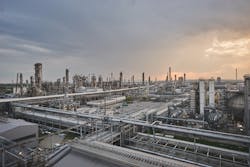OMV’s Schwechat refinery implements CO2-reduction measures
OMV Aktiengesellschaft, Vienna, is implementing a project involving multiple energy efficiency measures to reduce carbon dioxide (CO2) emissions at its 9.6-million tonnes/year (tpy) refinery in Schwechat, Austria.
During an inspection program at the site, three of the refinery’s four steam turbines—which, together, generate 85% of electricity required to operate the refinery—were overhauled with specially molded turbine blades based on modern 3D-blade geometry from Siemens Aktiengesellschaft to increase turbine effectiveness by ensuring better flow, increased energy production, and overall efficiency, OMV said.
As of Sept. 22, two of the turbines have been outfitted with the 3D-blade geometry, which in addition to enhancing steam turbine performance and efficiency, simultaneously has reduced CO2 emissions by 40,000 tonnes this year, according to the operator.
The third turbine will be equipped with the new blading in the coming year to enable a combined 60,000-tpy reduction in CO2 emissions from all three turbines beginning in 2021, OMV said.
Another energy efficiency measure currently under way at Schwechat includes development of a digital twin that uses process simulation to help optimize selection of cleaning cycles and flow conditions in the heat exchangers of the refinery’s crude distillation unit preheat train. Once completed, OMV said the digital twin will further reduce CO2 emissions at the site by up to 18,000 tpy.
OMV also is presently deploying digital controllers throughout the refinery to balance out fluctuations in control loops (e.g., in the butadiene unit or when reusing exhaust process heat). Now nearly completed, deployment of the digital controllers will result in another 4,000-tpy reduction in Schwechat’s CO2 emissions.
The energy efficiency measures—developed by a specially formed internal team responsible for implementing optimizations based on needs of each individual OMV site—come as part of OMV’s commitment by 2025 to reduce carbon intensity of its refining operations by at least 20% (vs. the 2010 baseline year) and to reach net-zero emissions of operations by 2050 or sooner, the operator said.
About the Author
Robert Brelsford
Downstream Editor
Robert Brelsford joined Oil & Gas Journal in October 2013 as downstream technology editor after 8 years as a crude oil price and news reporter on spot crude transactions at the US Gulf Coast, West Coast, Canadian, and Latin American markets. He holds a BA (2000) in English from Rice University and an MS (2003) in education and social policy from Northwestern University.

